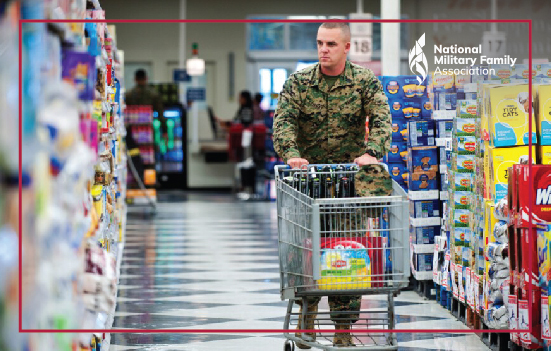Military Family Food Insecurity Isn’t New, But the Shutdown Made it Impossible to Ignore

When military pay is delayed or disrupted, families across the country feel the effects immediately. For some, it means deciding which bills to pay first or how to stretch what is left in the pantry.
The government shutdown did not create food insecurity among military families; it exacerbated what was already there. Each missed or partial paycheck shows what many have long understood: too many families are living on the edge, where even a short disruption in pay can threaten their stability.
The Crisis Beneath the Headlines
We’ve been hearing from military families everywhere who are worried about how to make ends meet. Some are rationing what’s left in their refrigerators; others are postponing bills, and many are turning to community food pantries.
Their experiences reflect a broader truth. Studies estimate that nearly one in four military families experience food insecurity, a statistic often overlooked in discussions about readiness and national defense.
Whether caused by a government shutdown, the high cost of living near military installations, or persistent challenges with spousal employment, the result is the same: families who serve the nation are struggling to meet basic needs.
A Hidden Struggle Made Visible
For Army spouse Amy C., the frustration runs deeper than a missed paycheck.
“This situation exposes how financially vulnerable many military families are. Too many are sunk if they miss one or two paychecks. It is disturbing that missing two weeks of pay can break so many people. This should be inconvenient, not life-changing.”
Food insecurity in military households isn’t a temporary symptom of one crisis. Amy’s words point to a persistent problem that existed long before this government shutdown and will likely last long after the current news cycle moves along. This is a chronic issue tied to systemic challenges that require long-term solutions.
The Readiness Connection
Families who worry about groceries, gas, and bills are less likely to focus on well-being, let alone support a service member’s mission. As one anonymous military spouse told us:
“If active-duty pay is impacted, we won’t be able to pay our bills. I worry that payments won’t be deferred and that everything will come due at once when the shutdown ends.”
Financial strain erodes morale, distracts from duty, and threatens the stability that military life demands.
Moving from Awareness to Action
Whether or not the government is open, the financial uncertainty that military families face will remain. These moments shine a light on a larger issue: too many families are one missed paycheck away from crisis.
NMFA believes that the families who serve this country should never face hunger. That’s why we continue to advocate for policies that safeguard military pay, champion military spouse employment, and strengthen support systems that help families weather financial challenges for emergencies.
Conclusion
While military family food insecurity isn’t a new issue, the recent disruption in pay has brought to light the quiet struggles that have unfolded in kitchens and commissaries for years. Families who serve our nation should never have to fight to feed themselves.
Awareness alone is not enough. Stability must be guaranteed, not hoped for. Every military family deserves the assurance that their basic needs will be met, regardless of politics or circumstance.
The strength of our military begins at home. When families are secure, our nation is stronger. Together, we can turn awareness into action and ensure that every military family has stability, dignity, and a full table.
Together We’re Stronger®
By: Olivia Brinsfield, Content Manager





